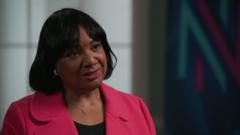The horrific events of October 7, when Hamas unleashed a brutal attack, were not just an act of extreme violence; they were also a calculated attempt to destabilize a budding coalition in the Middle East.
This coalition, spearheaded by Israel alongside Gulf states like the United Arab Emirates and Bahrain, was on the verge of establishing a historic normalization deal with the Kingdom of Saudi Arabia. Thus far, Hamas has succeeded in its aim, jeopardizing progress and peace in the region.
To counter this, the most effective punishment for Hamas and other Iranian proxies, including Hezbollah, would be to revitalize the normalization process. A crucial step in this direction is to resume negotiations for a two-state solution, which has long been recognized as essential for lasting peace.
Saudi Arabia has been unequivocal: normalization cannot proceed without renewed discussions about a Palestinian state. This position is echoed by officials from the United Arab Emirates and Bahrain, emphasizing that their support hinges on establishing Palestinian rights.
It is understandable that, in the wake of such atrocities, most Israelis — especially members of the government — are firmly opposed to statehood for the Palestinians. However, as we approach Rosh Hashanah, a time of reflection and renewal, we must confront the reality of our situation. We need to transcend our pain and justified anger and break free from a cycle that leads us nowhere.
Rosh Hashanah is a time for self-examination and self-evaluation — not only as individuals but also as a community and a people. This period invites introspection, for individuals and for our collective identity. The Hebrew word “Shanah” means “year,” and shares a root with “shinui,” meaning “change.” This signifies our potential to shape a year marked by transformation.
Looking back over the past year, particularly the ongoing conflict among Israel, Hamas and Hezbollah, it is clear that little has changed. We remain trapped in a cycle of violence that has caused profound suffering on both sides.
The Abraham Accords once ignited hope for regional cooperation, bolstered by increasing economic and social exchanges. However, it’s vital to remember that the support from the UAE and Bahrain was rooted in their commitment to Palestinian rights.
While the current conflict has highlighted Israel’s capacity for defense, it is time for the Israeli government and American Jewish leaders to explore a normalization path as expressed by the Jewish state’s Arab friends and allies. Rosh Hashanah calls us to be open to transformative change and to seize this moment for a better future.
Change, while necessary, is rarely easy. It demands vision and courage. As we reflect on our past and engage in self-examination, let us be open to shifting our mindset. Embracing the Saudi offer for renewed normalization could pave the way for a more stable and peaceful Middle East and a transformation in Muslim-Jewish relations worldwide. This Rosh Hashanah, let us take bold steps forward, recognizing that lasting change is not just possible — it is imperative.
Rabbi Marc Schneier is the author of “Sons of Abraham: A Candid Conversation about the Issues That Divide and Unite Jews and Muslims,” and president of the New-York based Foundation for Ethnic Understanding.















 English (US) ·
English (US) ·